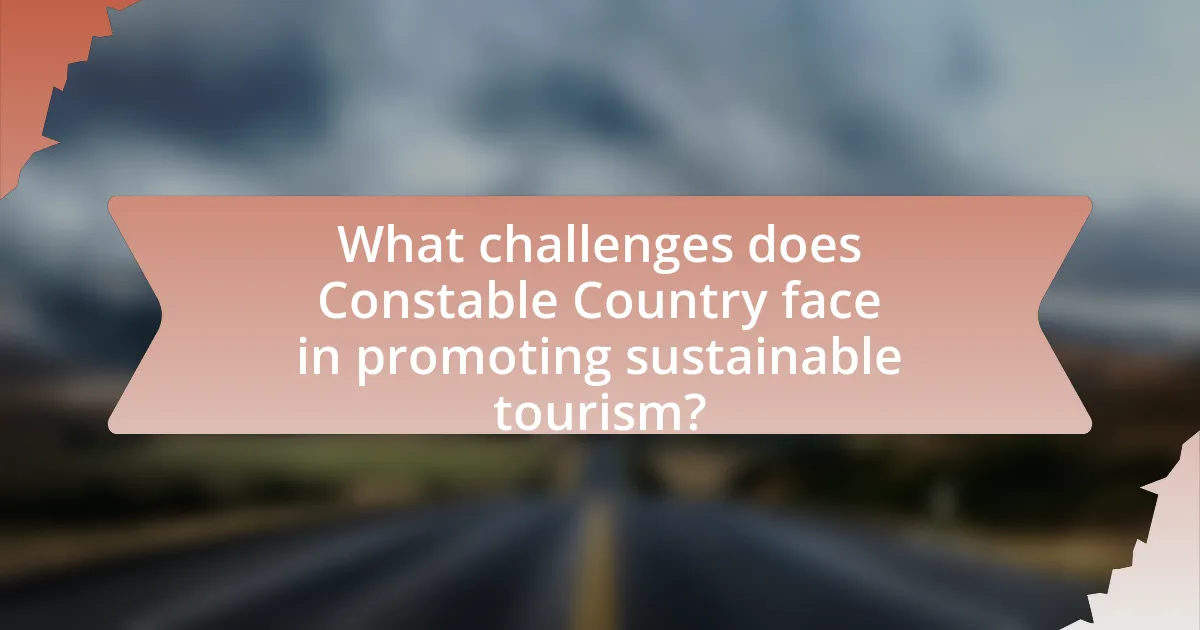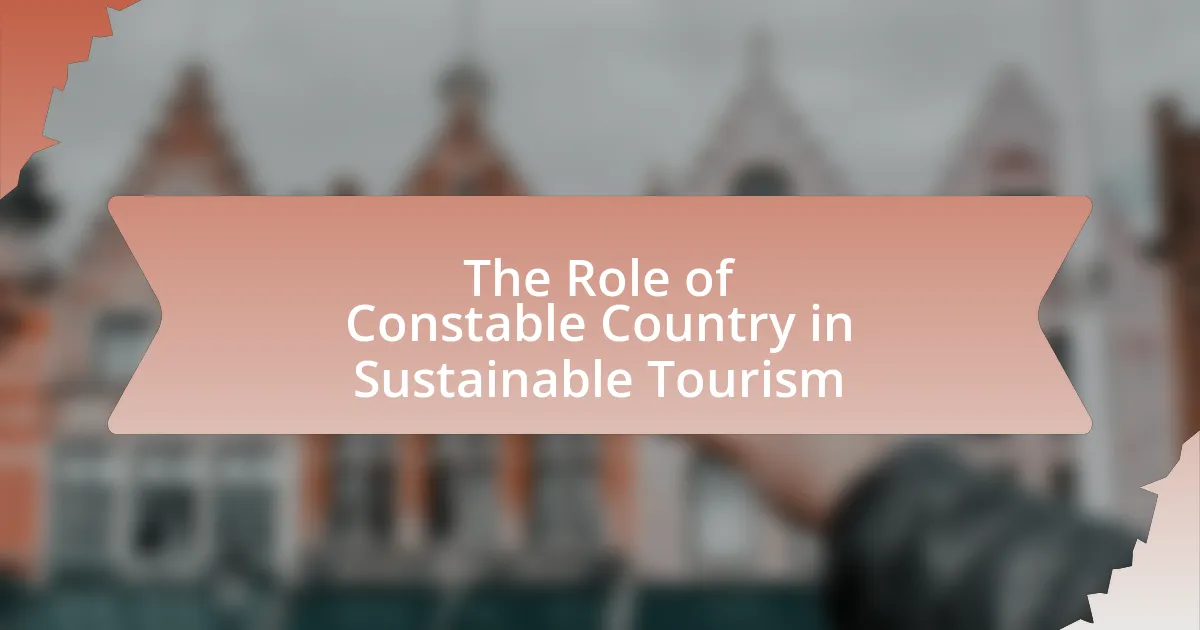Constable Country, located in the Dedham Vale of Essex, England, is recognized for its breathtaking landscapes that inspired the artist John Constable and plays a significant role in sustainable tourism. The region emphasizes conservation, supports local economies, and encourages responsible visitor behavior, aligning with sustainable tourism principles. Key aspects include the preservation of natural resources, the enhancement of local culture, and the implementation of eco-friendly practices to minimize environmental impact. Additionally, community involvement and local business engagement are crucial in shaping sustainable tourism efforts, while challenges such as tourism pressures and seasonal fluctuations necessitate ongoing management strategies. Visitors are encouraged to participate in sustainable practices, support local conservation projects, and engage with the community to ensure the long-term viability of Constable Country as a sustainable tourism destination.

What is Constable Country and its significance in sustainable tourism?
Constable Country is a picturesque area in the Dedham Vale, located in Essex, England, known for its stunning landscapes that inspired the artist John Constable. Its significance in sustainable tourism lies in its commitment to preserving natural beauty while promoting eco-friendly travel practices. The region attracts visitors seeking outdoor activities, such as walking and cycling, which minimize environmental impact. Additionally, local initiatives focus on conservation and supporting the community, ensuring that tourism benefits both the environment and the economy. This approach aligns with sustainable tourism principles, fostering a balance between visitor enjoyment and ecological preservation.
How does Constable Country contribute to the principles of sustainable tourism?
Constable Country contributes to the principles of sustainable tourism by promoting conservation, supporting local economies, and encouraging responsible visitor behavior. The area’s natural beauty and cultural heritage attract tourists, which generates revenue that can be reinvested into environmental protection initiatives. For instance, the Dedham Vale Area of Outstanding Natural Beauty (AONB) management plan emphasizes habitat preservation and sustainable land use practices, ensuring that tourism activities do not harm the landscape. Additionally, local businesses benefit from tourism, creating jobs and fostering community engagement, which aligns with sustainable tourism’s goal of benefiting local populations.
What natural resources are preserved in Constable Country?
Constable Country preserves a variety of natural resources, including landscapes, biodiversity, and water resources. The area is known for its picturesque countryside, characterized by rolling hills, rivers, and wetlands that support diverse flora and fauna. Specifically, the River Stour and its surrounding meadows are vital for maintaining local ecosystems and providing habitats for wildlife. Additionally, the preservation of these natural resources contributes to sustainable tourism by attracting visitors interested in nature and conservation, thereby supporting the local economy while ensuring environmental protection.
How does the local culture enhance sustainable tourism in Constable Country?
Local culture enhances sustainable tourism in Constable Country by promoting authentic experiences that attract visitors while preserving the region’s heritage. The integration of local art, cuisine, and traditions into tourism offerings fosters a deeper connection between tourists and the community, encouraging responsible travel practices. For instance, local festivals and markets showcase traditional crafts and foods, which not only support local artisans but also educate visitors about the area’s history and customs. This cultural engagement leads to increased economic benefits for residents and a commitment to environmental stewardship, as the community recognizes the value of maintaining its unique identity for future generations.
Why is Constable Country considered a model for sustainable tourism?
Constable Country is considered a model for sustainable tourism due to its successful integration of conservation efforts with local community engagement and economic benefits. The region promotes environmentally friendly practices, such as maintaining natural landscapes and biodiversity, while also supporting local businesses through tourism. For instance, initiatives like the Dedham Vale AONB (Area of Outstanding Natural Beauty) encourage visitors to appreciate the natural environment responsibly, which helps preserve the area’s cultural heritage and scenic beauty. This balance between tourism and conservation exemplifies sustainable tourism principles, making Constable Country a benchmark for similar regions.
What practices are implemented to minimize environmental impact?
Practices implemented to minimize environmental impact in Constable Country include promoting eco-friendly transportation, encouraging local sourcing of food and products, and implementing waste reduction strategies. Eco-friendly transportation options, such as cycling and walking trails, reduce carbon emissions and promote sustainable travel. Local sourcing supports the economy while minimizing transportation-related environmental costs. Waste reduction strategies, including recycling programs and composting initiatives, help decrease landfill contributions and promote resource conservation. These practices collectively contribute to sustainable tourism and environmental preservation in the region.
How does community involvement shape sustainable tourism in Constable Country?
Community involvement significantly shapes sustainable tourism in Constable Country by fostering local stewardship and enhancing visitor experiences. Engaged communities actively participate in decision-making processes, ensuring that tourism development aligns with local values and environmental conservation. For instance, initiatives led by local residents, such as guided nature walks and cultural workshops, not only promote the region’s heritage but also generate economic benefits while preserving natural resources. Research indicates that areas with strong community engagement in tourism planning see a 30% increase in visitor satisfaction, highlighting the importance of local input in creating meaningful and sustainable tourism experiences.

What challenges does Constable Country face in promoting sustainable tourism?
Constable Country faces several challenges in promoting sustainable tourism, primarily due to balancing visitor numbers with environmental preservation. The area experiences pressure from increased tourist traffic, which can lead to habitat degradation and strain on local resources. Additionally, there is a lack of awareness among visitors regarding sustainable practices, which complicates efforts to encourage responsible tourism behaviors. Furthermore, local businesses may prioritize short-term economic gains over long-term sustainability, undermining initiatives aimed at protecting the landscape and cultural heritage. These factors collectively hinder the effective promotion of sustainable tourism in Constable Country.
How do tourism pressures affect the environment in Constable Country?
Tourism pressures significantly impact the environment in Constable Country by increasing pollution, habitat degradation, and resource depletion. The influx of visitors leads to higher waste generation, including litter and sewage, which can contaminate local waterways and harm wildlife. Additionally, the foot traffic from tourists can erode natural landscapes and disturb local flora and fauna, disrupting ecosystems. Studies indicate that areas with high tourist activity often experience a decline in biodiversity, as native species struggle to compete with human-induced changes. For instance, the National Trust has reported that popular walking trails in Constable Country show signs of wear and tear, necessitating ongoing maintenance to mitigate environmental damage.
What measures are taken to mitigate the impact of tourism on local ecosystems?
Measures taken to mitigate the impact of tourism on local ecosystems include implementing strict regulations on visitor numbers, promoting eco-friendly practices, and establishing protected areas. For instance, many destinations limit the number of tourists allowed in sensitive areas to reduce environmental stress, which helps preserve biodiversity. Additionally, educational programs encourage tourists to engage in sustainable behaviors, such as minimizing waste and respecting wildlife. Research indicates that these strategies can significantly reduce the ecological footprint of tourism, as seen in various protected regions where visitor management has led to improved ecosystem health.
How does seasonal tourism affect sustainability efforts in Constable Country?
Seasonal tourism in Constable Country significantly impacts sustainability efforts by creating fluctuations in resource demand and environmental stress. During peak seasons, increased visitor numbers lead to higher waste generation, strain on local infrastructure, and potential degradation of natural landscapes. For instance, a study by the University of Essex highlighted that the influx of tourists can result in a 30% increase in litter and pollution levels in popular areas. This seasonal pressure complicates the implementation of sustainable practices, as local authorities must balance visitor enjoyment with conservation efforts. Consequently, effective management strategies are essential to mitigate these impacts and promote long-term sustainability in Constable Country.
What role do local businesses play in sustainable tourism in Constable Country?
Local businesses in Constable Country play a crucial role in promoting sustainable tourism by providing eco-friendly services and products that minimize environmental impact. These businesses often prioritize local sourcing, which reduces carbon footprints associated with transportation and supports the local economy. For instance, restaurants may use locally grown produce, while accommodations might implement energy-efficient practices. Additionally, local businesses contribute to cultural preservation by offering authentic experiences that reflect the region’s heritage, thereby enhancing visitor engagement and education about sustainability. This approach not only attracts environmentally conscious tourists but also fosters a sense of community and responsibility among residents, reinforcing the importance of sustainable practices in tourism.
How can local businesses support conservation efforts?
Local businesses can support conservation efforts by implementing sustainable practices, such as reducing waste, sourcing local materials, and promoting eco-friendly products. For instance, businesses can adopt recycling programs and minimize single-use plastics, which contribute to environmental degradation. According to a study by the World Wildlife Fund, businesses that engage in sustainable practices can reduce their carbon footprint by up to 30%. Additionally, local businesses can collaborate with conservation organizations to fund projects that protect local ecosystems, thereby enhancing biodiversity and attracting eco-conscious tourists.
What are the benefits of eco-friendly practices for local enterprises?
Eco-friendly practices provide significant benefits for local enterprises by enhancing their sustainability, reducing operational costs, and improving brand reputation. Implementing such practices often leads to lower energy and resource consumption, which can decrease expenses; for instance, businesses that adopt energy-efficient technologies can save up to 30% on energy bills. Additionally, eco-friendly practices attract environmentally conscious consumers, thereby increasing customer loyalty and market share. According to a Nielsen report, 66% of global consumers are willing to pay more for sustainable brands, highlighting the financial advantage of adopting eco-friendly initiatives. Furthermore, local enterprises that engage in sustainable practices can benefit from government incentives and grants aimed at promoting environmental responsibility, further solidifying their economic viability.

How can visitors engage in sustainable tourism practices in Constable Country?
Visitors can engage in sustainable tourism practices in Constable Country by prioritizing local experiences, minimizing environmental impact, and supporting community initiatives. By choosing to stay in eco-friendly accommodations and utilizing public transport or cycling, tourists can reduce their carbon footprint. Additionally, participating in local conservation efforts, such as volunteering for habitat restoration or wildlife monitoring, directly contributes to the preservation of the area’s natural beauty. Supporting local businesses, such as farmers’ markets and artisan shops, ensures that economic benefits remain within the community, fostering sustainable development. These practices not only enhance the visitor experience but also help maintain the integrity of Constable Country’s landscapes and culture.
What are the best practices for tourists to follow in Constable Country?
Tourists in Constable Country should prioritize respecting the natural environment and local communities. This includes following designated paths to minimize ecological impact, avoiding littering, and adhering to local guidelines regarding wildlife interactions. Additionally, tourists should support local businesses by purchasing goods and services from the community, which fosters sustainable economic practices. Engaging in responsible photography by not disturbing wildlife or private property is also essential. These practices contribute to the preservation of Constable Country’s landscapes and cultural heritage, ensuring that the area remains a viable destination for future visitors.
How can visitors minimize their carbon footprint while exploring Constable Country?
Visitors can minimize their carbon footprint while exploring Constable Country by utilizing public transportation, walking, or cycling instead of driving. Public transport options, such as buses and trains, significantly reduce individual emissions compared to private vehicles. Additionally, walking and cycling not only lower carbon output but also enhance the experience of the natural landscape. According to the UK Department for Transport, public transport can reduce carbon emissions by up to 45% per passenger mile compared to cars. Engaging in eco-friendly practices, such as choosing local accommodations that prioritize sustainability, further contributes to minimizing environmental impact.
What activities promote environmental awareness among tourists in Constable Country?
Activities that promote environmental awareness among tourists in Constable Country include guided nature walks, wildlife observation tours, and participation in local conservation projects. Guided nature walks educate visitors about the local ecosystem, highlighting the importance of biodiversity and conservation efforts. Wildlife observation tours provide insights into the native species and their habitats, fostering a deeper appreciation for the environment. Additionally, engaging in local conservation projects allows tourists to contribute directly to environmental preservation, reinforcing the significance of sustainable practices. These activities collectively enhance tourists’ understanding of environmental issues and encourage responsible tourism behaviors.
What resources are available for tourists interested in sustainable practices?
Tourists interested in sustainable practices can access various resources, including eco-tourism guides, local sustainability initiatives, and educational programs. Eco-tourism guides provide information on environmentally friendly accommodations, activities, and transportation options that minimize ecological impact. Local sustainability initiatives often include community-led projects that promote conservation and responsible tourism, such as wildlife protection programs and organic farming tours. Educational programs, often offered by local organizations, teach tourists about sustainable practices and the importance of preserving natural and cultural heritage. These resources collectively support informed decision-making for travelers seeking to engage in sustainable tourism in Constable Country.
Where can tourists find information on eco-friendly accommodations in Constable Country?
Tourists can find information on eco-friendly accommodations in Constable Country through local tourism websites, such as the official Visit Constable Country site, which lists sustainable lodging options. Additionally, platforms like EcoHotels.com and Green Key provide directories of environmentally friendly accommodations, ensuring travelers can make informed choices. These resources highlight establishments that adhere to sustainability practices, such as energy efficiency and waste reduction, supporting the region’s commitment to sustainable tourism.
What local organizations support sustainable tourism initiatives in Constable Country?
Local organizations that support sustainable tourism initiatives in Constable Country include the Constable Country Landscape Partnership and the Dedham Vale AONB (Area of Outstanding Natural Beauty) and Stour Valley Project. The Constable Country Landscape Partnership focuses on conserving the natural and cultural heritage of the area while promoting responsible tourism practices. The Dedham Vale AONB and Stour Valley Project work to enhance the landscape’s sustainability through community engagement and environmental stewardship, ensuring that tourism benefits both visitors and local residents.
How can tourists contribute to the sustainability of Constable Country?
Tourists can contribute to the sustainability of Constable Country by engaging in responsible travel practices that minimize environmental impact and support local communities. By choosing eco-friendly accommodations, tourists help reduce carbon footprints and promote sustainable business practices. Additionally, participating in local tours led by community members fosters economic benefits for residents, ensuring that tourism revenue supports conservation efforts and local culture. Evidence shows that sustainable tourism can lead to a 20% increase in local income, which directly benefits conservation initiatives in natural areas like Constable Country.
What volunteer opportunities exist for visitors in Constable Country?
Visitors in Constable Country can engage in various volunteer opportunities, primarily focused on conservation and community support. Organizations such as the National Trust and local wildlife groups often seek volunteers for tasks like habitat restoration, trail maintenance, and educational programs. These activities not only help preserve the natural beauty of the area but also promote sustainable tourism by fostering a sense of community involvement and environmental stewardship.
How can tourists support local conservation projects during their visit?
Tourists can support local conservation projects during their visit by participating in eco-tours that directly fund these initiatives. Engaging in activities such as guided nature walks or wildlife observation tours often contributes a portion of the fees to conservation efforts. For example, in Constable Country, eco-tourism operators may allocate funds from ticket sales to habitat restoration projects, which helps maintain biodiversity and protect local ecosystems. Additionally, tourists can volunteer for local conservation activities, such as beach clean-ups or tree planting, which not only aids the environment but also fosters a deeper connection to the area.


